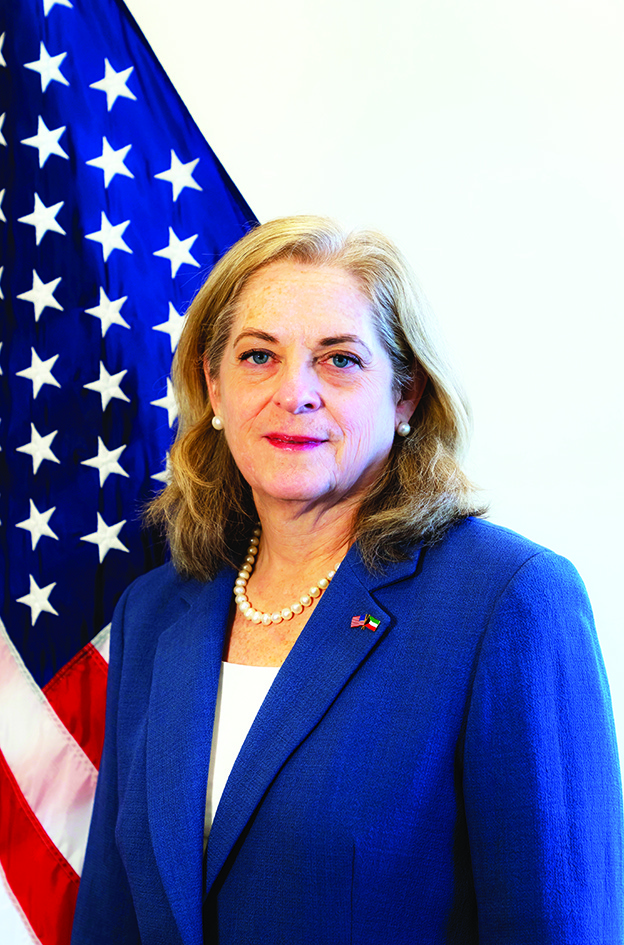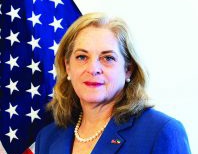
KUWAIT: The United States' Ambassador to Kuwait Alina Romanowski spoke in an interview about a variety of topics related to the fight against the spread of the coronavirus (COVID-19) in Kuwait and globally. The following are excerpts from the interview:
Question: How do you spend your days during the Coronavirus crisis?
Ambassador Alina Romanowski: My highest priority during the COVID-19 crisis is the welfare and security of American citizens in Kuwait, including the US Embassy staff and their families. I work every day to ensure that we are helping those in urgent need.
I spend my days maintaining close contact with the Kuwaiti government and my colleagues in the region and back in Washington on the latest developments regarding COVID-19. I commend the Kuwaiti government for its proactive response to COVID-19. The United States is committed to working with Kuwait and other members of the international community to stop the spread of this disease.
The US Embassy staff have largely shifted to working from home to follow social distancing practices and reduce the direct contact among employees. We are continuously updating information for the public on our website as well as providing emergency services to American citizens, and are available to those who need assistance. American citizens in need of emergency assistance or services should contact us at 2259-1001. Otherwise, you may e-mail us at [email protected].
While COVID-19 developments dominate the headlines and much of our lives, the US Embassy is still conducting the foreign policy of America in Kuwait. We have not lost sight of the need for maintaining and strengthening our cooperation with Kuwait on a range of political, economic, and security issues, and we are now more closely working together on health issues.
It is important to follow instructions from official authorities and also important to keep our spirits up during these challenging times. We should ensure that we maintain both our physical wellbeing as well as our emotional wellbeing. For some, that may mean engaging in activities with family at home, or trying new hobbies, keeping in mind social distancing advice. During my free time, I have been reading, exercising at home, watching movies, and catching up with my friends on social media.
These are trying times for everyone. I want to express my appreciation for the tireless efforts of Kuwait's public servants, particularly its health care workers, to support the health and wellbeing of everyone living in Kuwait.
Question: How is the Embassy engaging with its citizens in the country on COVID-19?
Romanowski: We remain committed to doing everything we can to protect the health and welfare of American citizens overseas, and the Department of State is actively working with governments and international partners around the world, including Kuwait, to combat the spread of COVID-19. We are continuously assessing travel conditions in areas affected by COVID-19, including Kuwait, and we update travel advisories and safety information for US citizens as situations evolve on the US Embassy website.
I recommend that US citizens enroll in the State Department's Smart Traveler Enrollment Program (STEP) so that they can receive important messages about Kuwait, including timely alerts and updates to travel advisories. I also encourage American citizens to continually check the US Embassy's webpage devoted exclusively to COVID-19: https://kw.usembassy.gov/covid-19-information. We update this page daily, including on weekends.
This website also contains links to official information from Kuwaiti authorities, including contact details for the local authorities that can provide assistance and information in English. The US Embassy stands ready to help, and we can be contacted at 2259-1001 (for emergency assistance or services) or [email protected] for non-emergency inquiries.
Question: How do you evaluate Kuwait's procedures and measures to combat the virus?
Romanowski: COVID-19 is a health concern that is being taken very seriously by both the United States and Kuwaiti governments. The Kuwaiti government has taken an active approach to prevent the spread of COVID-19 in a manner consistent with guidance from the World Health Organization. I commend the Kuwaiti government for its efforts and for the hard work and dedication of its public servants and health practitioners.
At the US Embassy, we strongly believe that we must do our part to slow the spread of COVID-19. This includes teleworking, not gathering in large groups, practicing social distancing, and protecting our health through constant hand washing and other good hygiene practices. We are all members of a global team, and together we must employ the most effective strategies to combat this disease.
The United States government also believes in doing its part globally. On March 2, the United States Agency for International Development (USAID) announced $37 million in financing for countries affected by, or at high risk to the spread of, COVID-19. That is in addition to the $100 million and more than 17 tons of humanitarian assistance that the United States sent to the Chinese people in January.
This interview was previously published in Arabic in Al-Anbaa newspaper. Reprinted with permission of the US Embassy in Kuwait and Al-Anbaa newspaper.











